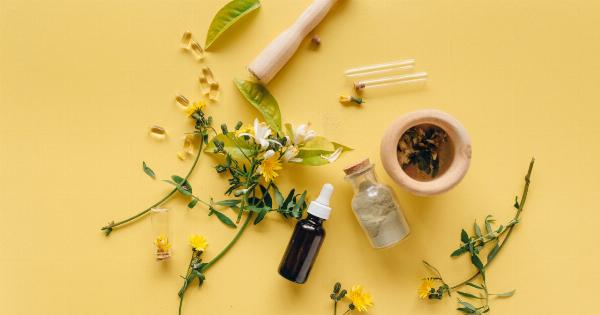Headaches can be a real pain, both literally and figuratively. They can occur for a variety of reasons, including tension, stress, dehydration, and poor nutrition.
While over-the-counter painkillers can provide temporary relief, they often come with side effects and can be harmful when used excessively. Fortunately, there are many natural remedies that can help alleviate headaches without the harmful side effects.
H2: Stay Hydrated
Dehydration is a common cause of headaches, particularly migraines. To stay hydrated, make sure to drink plenty of water throughout the day. If plain water doesn’t appeal to you, try adding a slice of lemon or lime to your glass.
You can also eat water-based foods like watermelon, cucumbers, and strawberries to help keep you hydrated.
H2: Use Essential Oils
Essential oils can be a powerful tool in the fight against headaches. Peppermint oil has been shown to help relieve tension headaches by relaxing muscles and improving blood flow.
Lavender oil is another popular choice, as it can help calm the mind and reduce stress. To use essential oils, simply dilute a few drops in a carrier oil such as coconut oil and apply to the temples and forehead.
H2: Practice Yoga and Meditation
Yoga and meditation are ancient practices that have been shown to help reduce stress and tension, two common triggers for headaches.
Yoga poses such as the Child’s Pose and the Forward Fold can help relax the body and relieve tension in the neck and shoulders. Meditation can help calm the mind and reduce anxiety, which can also help alleviate headaches.
H2: Apply Heat or Cold
Applying heat or cold can be a simple and effective way to relieve headaches. For tension headaches, try placing a warm compress on the forehead or neck to help relax the muscles.
For migraines, a cold compress may be more effective at constricting blood vessels and reducing inflammation. Experiment to see which temperature works best for you.
H2: Eat a Balanced Diet
A balanced diet rich in fruits, vegetables, and whole grains can provide the essential vitamins and minerals necessary for overall health, including headache prevention.
Magnesium, for example, has been shown to help reduce the frequency and severity of migraines. Foods high in magnesium include leafy greens, nuts, seeds, and whole grains.
H2: Try Acupuncture
Acupuncture is an ancient Chinese practice that involves the insertion of thin needles into specific points on the body. It has been shown to help reduce the frequency and severity of headaches by stimulating the body’s natural healing response.
If you’re interested in trying acupuncture, be sure to find a qualified practitioner.
H2: Practice Good Posture
Many headaches, particularly tension headaches, are caused by poor posture. Slouching or hunching over can put strain on the neck and shoulders, leading to muscle tension and headaches.
Practice good posture by sitting up straight, keeping your shoulders relaxed, and aligning your ears over your shoulders.
H2: Take a Break
When working or studying for long periods of time, it’s important to take frequent breaks to avoid eye strain and muscle tension, which can lead to headaches.
Try the 20-20-20 rule: every 20 minutes, look away from your screen for 20 seconds and focus on something 20 feet away. Taking short breaks to stretch, walk around, or simply close your eyes and breathe deeply can also help prevent headaches.
H2: Get Enough Sleep
Getting enough sleep is essential for overall health and can help prevent headaches. Aim for 7-9 hours of sleep each night, and try to establish a regular sleep schedule by going to bed and waking up at the same time each day.
If you’re having trouble sleeping, try establishing a bedtime routine that includes relaxing activities such as reading or a warm bath.
H2: Practice Self-Care
Self-care is an important aspect of overall health and can help prevent headaches by reducing stress and promoting relaxation. Make time for activities that you enjoy, such as reading, gardening, or spending time with loved ones.
Treat yourself to a massage or take a long bath. Prioritizing your mental and physical health is key to preventing headaches.































